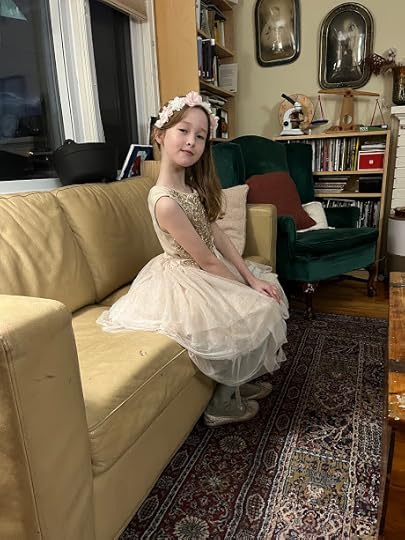Rob Mclennan's Blog, page 71
November 20, 2023
Happy Tenth Birthday, Emperor Rose!
November 19, 2023
12 or 20 (second series) questions with Joanne Leow
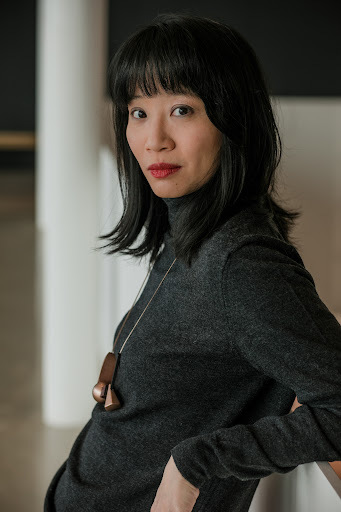 Joanne Leow
grew up in Singapore and lives as an uninvited guest on the unceded territories of the Coast Salish peoples, including the Sḵwx̱wú7mesh Úxwumixw (Squamish), səlilwətaɬ/Selilwitulh (Tsleil-Waututh), xʷməθkʷəy̓əm (Musqueam) and Kwikwetlem First Nations. She is an Associate Professor at Simon Fraser University. Her creative work and research lie at the intersections of the environmental humanities, transnational and diasporic cultural production, intimacies, autotheory, and decoloniality. Her writing has been published in Brick, Catapult, Evergreen Review, The Goose, Isle, The Kindling, The Town Crier, and Ricepaper Magazine.
Seas Move Away
is her debut collection of poetry.
Joanne Leow
grew up in Singapore and lives as an uninvited guest on the unceded territories of the Coast Salish peoples, including the Sḵwx̱wú7mesh Úxwumixw (Squamish), səlilwətaɬ/Selilwitulh (Tsleil-Waututh), xʷməθkʷəy̓əm (Musqueam) and Kwikwetlem First Nations. She is an Associate Professor at Simon Fraser University. Her creative work and research lie at the intersections of the environmental humanities, transnational and diasporic cultural production, intimacies, autotheory, and decoloniality. Her writing has been published in Brick, Catapult, Evergreen Review, The Goose, Isle, The Kindling, The Town Crier, and Ricepaper Magazine.
Seas Move Away
is her debut collection of poetry.1 - How did your first book change your life? How does your most recent work compare to your previous? How does it feel different?
I think that before I published my first poetry collection, seas move away, I didn’t really see myself as a poet or writer but primarily as an academic and ex-journalist. Seeing my poems in print, on the shelves of bookstores and in the hands of readers really helped me understand the materiality of my work.
2 - How did you come to poetry first, as opposed to, say, fiction or non-fiction?
I have been writing poetry since high school… one thing that really changes how I approached it was taking a workshop with the late C.D. Wright at Brown during my undergraduate degree. Reading her work and having my own poems workshopped really opened up my mind to what poetry could be and do.
3 - How long does it take to start any particular writing project? Does your writing initially come quickly, or is it a slow process? Do first drafts appear looking close to their final shape, or does your work come out of copious notes?
I tend to spend a long time thinking about something and then when it comes to setting down words on the paper, that process usually happens fairly quickly. Especially for poems, my initial prose draft is quite close to the final piece. For me, editing is a process of sharpening, cutting, and breaking up the line.
4 - Where does a poem usually begin for you? Are you an author of short pieces that end up combining into a larger project, or are you working on a "book" from the very beginning?
Between work and family life, especially when I was caring for two young boys and then elderly family members who were in a different country, I have always only ever had the time to write in fragments. Yet, I do think these fragments are part of a whole, it’s just that sometimes I can’t see the entire book until the last fragment is down and I can go about structuring my pieces.
5 - Are public readings part of or counter to your creative process? Are you the sort of writer who enjoys doing readings?
I love public readings, as someone who teaches the words of others, it has been a revelatory experience to read and reread my own words to many different audiences. I find that my relationship to my own poems evolve as I read them aloud in different contexts and I learn so much about them from how an audience reacts.
6 - Do you have any theoretical concerns behind your writing? What kinds of questions are you trying to answer with your work? What do you even think the current questions are?
I think it’s an occupational hazard as an academic, but yes, I do have larger theoretical concerns behind my writing. I often find that my poetry and creative nonfiction are where I work out things that can’t be said or explored in conventional academic writing. I find it freeing to incorporate elements of memoir and experiment with language in my creative practice. I am very much concerned with how bodies react when subjected to power and desire and an increasingly hostile climate. I’m interested in global environmental histories and how these are manifested in our family stories and our everyday lives.
7 – What do you see the current role of the writer being in larger culture? Do they even have one? What do you think the role of the writer should be?
I think there shouldn’t be one way to be in larger culture prescribed for all writers. I think that whether they choose to work in a political way or an ahistorical mode, that perhaps there is a need for all different kinds of writing… I admire, read and teach writers who consistently speak truth to power and who aren’t afraid to take risks that way. But I also enjoy writing that lets me escape into different worlds or laugh at silly foibles. I think it’s important to keep that sense of joy alive as well.
8 - Do you find the process of working with an outside editor difficult or essential (or both)?
I find it essential. I have really enjoyed the limited experience I have been privileged to have with literary editors. I think it is so crucial to have an outside perspective on one’s writing… by the end of the first draft, very often you can’t see the forest for the trees as it were.
9 - What is the best piece of advice you've heard (not necessarily given to you directly)?
Finish things.
10 - How easy has it been for you to move between genres (poetry to critical prose)? What do you see as the appeal?
I love all kinds of language and diction, and even if certain legal or political language makes me angry, its power still fascinates me. So in that vein, I actually find it easy to move between genres… terms, words, ideas just spill over from one to the other and sometimes break down these boundaries.
11 - What kind of writing routine do you tend to keep, or do you even have one? How does a typical day (for you) begin?
I don’t have a writing routine! It’s hard to hold down a full time job and to have a family and to find time to write. I start the day with a cup of tea, looking out of my window and then saying good morning to my household of pets and humans.
12 - When your writing gets stalled, where do you turn or return for (for lack of a better word) inspiration?
I go for a walk or take out my watercolours. I try to take my mind off the task at hand knowing that on some level my brain is still working things out.
12 or 20 (second series) questions;
November 18, 2023
the genealogy book : an ongoing work-in-progress via substack,
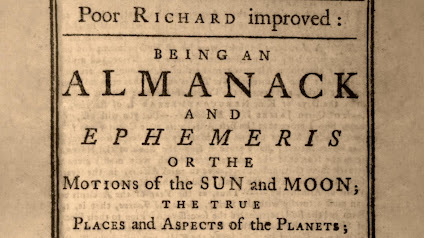 Incase you haven’t caught,
I’ve been posting excerpts (six so far) of my current non-fiction work-in-progress on my substack for a while now
, “the genealogybook.” With the discovery of my birth mother’s name and other details over thepast decade, I’ve been deliberately working to explore some of these new threadsand their implications. Over the past two months, I’ve been posting pieces on variousLoyalist/New England threads, including Puritan (Boston, etcetera), German (I’mcurrently working a piece that references Philadelphia’s Germantown), Irish(the Peter Robinson settlers of Ontario) and Dutch (the New Netherlandssettlement), as well as the counterpoint of my Glengarry Scottish upbringingand foundation. I have a whole new family tree, someone said. I think, instead,I simply have two trees that meet at the roots. Am I any less one side nowbecause of this other?
Incase you haven’t caught,
I’ve been posting excerpts (six so far) of my current non-fiction work-in-progress on my substack for a while now
, “the genealogybook.” With the discovery of my birth mother’s name and other details over thepast decade, I’ve been deliberately working to explore some of these new threadsand their implications. Over the past two months, I’ve been posting pieces on variousLoyalist/New England threads, including Puritan (Boston, etcetera), German (I’mcurrently working a piece that references Philadelphia’s Germantown), Irish(the Peter Robinson settlers of Ontario) and Dutch (the New Netherlandssettlement), as well as the counterpoint of my Glengarry Scottish upbringingand foundation. I have a whole new family tree, someone said. I think, instead,I simply have two trees that meet at the roots. Am I any less one side nowbecause of this other?I’mattempting to treat the substack like a weekly column, and most pieces that I’mposting these days are from this new project, although I am also interspersingwith short stories and the occasional other essay on prose writers (I recentlyposted one on Joy Williams and another on Ernest Hemingway, for example, withanother on Gail Scott forthcoming). You can sign up for free, or for the paidoption. I’m only posting “paid” pieces every third or fourth, as there’s stilla part of me that can’t quite offer terribly much that excludes non-payingoptions.
November 17, 2023
12 or 20 (second series) interview with Sophie Klahr
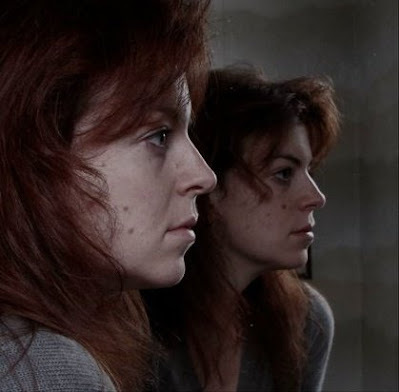
Sophie Klahr is the author of the poetrycollections Two Open Doors in a Field, Meet Me Here at Dawn, andthe collaborative prose work There Is Only One Ghost in the World,written alongside Corey Zeller. Her writing may be found in The New Yorker,American Poetry Review, Poetry London, and elsewhere. She teaches poetry courses online, and lives in Los Angeles.
1 - How did your first book orchapbook change your life? How does your most recent work compare to yourprevious? How does it feel different?
My first chapbook _____ VersusRecovery was published in 2007 by from Pilot Books, a small press (nowdefunct, alas) that hand-sewed gorgeous limited editions. I was 23, and it wasthe first time I’d had work out in the world that addressed my experiences withaddiction and (at the time, very new) recovery. Previous to that, I hadn’tpublished very much at all, and the warm reception the chapbook received wassurprising; suddenly, the most difficult things in my life drew people towardsme, not away.
My very recently published book There Is Only One Ghost in the World (FictionCollective 2) is wildly different from my previous two books, in that not onlyis it a collaborative work but that it is all prose, where my other books havebeen entirely verse. I’ve been writing in prose mostly for a year or so – it’sbeen interesting to take a breath from line breaks. At the moment, I don’t missthem.
2 - How did you come to poetry first,as opposed to, say, fiction or non-fiction?
My childhood was thick with an appreciation of sound. When he was home,no matter where my father was in the house, one could nearly always hear himsinging to himself. At simple everyday questions ( Q: Dad, where aremy ballet shoes?) he would often answer with some sort of poetic line ( A: Whosewoods these are, I think I know…), and at some point, I realized many ofthe verses he said to us (annoyingly, I thought back then) were inscribed inme—I came to know early what it meant to know something by heart. In this way,my becoming a poet became inevitable.
3 - How long does it take to start anyparticular writing project? Does your writing initially come quickly, or is ita slow process? Do first drafts appear looking close to their final shape, ordoes your work come out of copious notes?
What I end up revising the most heavily are my formal poems – some of mysonnets have taken 3 years to write. But there are exceptions – a sonnet ofmine which went viral a few years ago took about two weeks of tinkering untilit expressed that it was complete. I think it was Yeats who said (I may beparaphrasing?) “a poem comes right with a click like a closing box.” I justlisten for that click.
4 - Where does a poem usually beginfor you? Are you an author of short pieces that end up combining into a largerproject, or are you working on a "book" from the very beginning?
It seems to me that a poem comes either from a memory like a toothache orfrom a moment of music in passing. Formally, I do fall into patterns -- most ofthe verse I’ve written for the past 6 years turns towards the sonnet, and in mylast book of verse poems, Two Open Doors in a Field, most of them weresonnets that had the framework of driving and listening to the radio. Whensomething feels good, I tend to want more of it, and because of that, I’ll stayin a single vein of form and subject until some natural conclusion feelsreached, or, i.e. I feel a type of satiation.
5 - Are public readings part of orcounter to your creative process? Are you the sort of writer who enjoys doingreadings?
I prefer not to read my work in front of others; I think my body gets inthe way of my words.
6 - Do you have any theoreticalconcerns behind your writing? What kinds of questions are you trying to answerwith your work? What do you even think the current questions are?
The questions in the prose book I’m currently working surround the natureof honesty and center on an investigation of voice: what / who do we trust whenwe read? Where is the line between “fiction” and “nonfiction”? What does itmean to be an “unreliable” or “reliable” narrator? What stories are “worth”telling?
7 – What do you see the current roleof the writer being in larger culture? Does s/he even have one? What do youthink the role of the writer should be?
All writers do really in some ways ispoint to a moment or thing or idea and say Look! I’d hope that we allpoint to things that feel important, but “important” is defined differently foreveryone.
8 - Do you find the process of workingwith an outside editor difficult or essential (or both)?
These days, I tend to only ask for feedback from a friend or two when apiece feels too close to me, and the questions I put forth to them are usuallybroad. On a book level, I haven’t had much trouble, but that’s likely onlybecause the publishers I’ve had have offered very few edits.
9 - What is the best piece of adviceyou've heard (not necessarily given to you directly)?
Dorothy Parker once said “The cure for boredom is curiosity. There is nocure for curiosity.” I am not a person who ever gets bored, but it seems like agood piece of thought to pass along.
10 - How easy has it been for you tomove between genres (poetry to collaboration)? What do you see as the appeal?
I don’t sit down to write having any expectation for the form that wordswill become. Maybe the words will call for verse, maybe it will want to beprose. I’d like to collaborate more with people who work in visual mediums – afilmmaker friend recently invited me to collaborate on some pitches for adocumentary that won’t have anything to do with literature. I think it mightend up being about Komodo dragons. Collaboration is energizing in part becauseit exercises the muscle of listening, and leans away from ego.
11 - What kind of writing routine doyou tend to keep, or do you even have one? How does a typical day (for you)begin?
I have no routine whatsoever really. Each day begins with my cat beinghungry – his hunger is the most consistent thing in my life.
12 - When your writing gets stalled,where do you turn or return for (for lack of a better word) inspiration?
I don’t relate to the idea of being stalled with writing, but I think Iturn to physical activity when I get into psychic tangles of any kind. Walkingor dancing or swimming always feels clarifying, whether I’m in a moment ofwriting or not.
13 - What fragrance reminds you ofhome?
Roasted chicken and dust.
14 - David W. McFadden once said thatbooks come from books, but are there any other forms that influence your work,whether nature, music, science or visual art?
I think books come from questions. Of the suggestions above, I would saythat nature influences my writing most deeply–I read more nonfiction about thenatural world than any fiction or poetry. As far as visual art, I’ve held keptEdward Hopper’s work as a touchstone for decades years – his spaces and lightand sense of pause. I come from a fairly musical & music-loving family, soreferences to songs actually do seem to often show up in my work naturally. About10 years ago I lived sporadically with the musician Cass McCombs, and living ina space that was really saturated with his music meant that while writing, Iwas also often pausing to listen to the muffled sounds of what he was creatingand playing, far off in some other part of the house, and I think some of thatatmosphere was knit into what I was writing at the time—I actually drew thetitle of my first book Meet Me Here At Dawn from the name of one of hissongs.
15 - What other writers or writingsare important for your work, or simply your life outside of your work?
I am consistently return to Rilke’s Duino Elegies. They feel likea touchstone for spiritual inquiry.
16 - What would you like to do thatyou haven't yet done?
I would like to write a musical with someone! Musical theater is the mostcollaborative art form, and can be profoundly moving. I have been simmering aroundtwo specific ideas for musicals for many years – the key now is finding my owntime that might align with a composer who has time. I’d love to work with mydear friend Daniel Heath, whose work you’re familiar with if you’ve ever heard thelush strings beneath some of Lana Del Rey’s most popular songs, but he’sendlessly busy, so if you are a composer reading this, write to me!
17 - If you could pick any otheroccupation to attempt, what would it be? Or, alternately, what do you think youwould have ended up doing had you not been a writer?
I would have loved to be a paleontologist. It’s a bit late for that Ithink, but I’ve had a fascination with dinosaurs since I was little, and I’mfascinated by how our understanding of them continues to evolve. I recentlyread Steve Brusatte’s book The Rise and Fall of the Dinosaurs: A New History of a Lost World – highly recommend.
18 - What made you write, as opposedto doing something else?
I’m not even sure I can answer the question! Writing has never seemedlike much of a choice.
19 - What was the last great book youread? What was the last great film?
I will offer the two most recent collections of poetry I’ve read by peers:K. Iver’s Short Film Starring My Beloved’s Red Bronco and Eugenia Leigh’sBianca – both are brilliant and incisive.
20 - What are you currently workingon?
I’m working on a chapbook of poems about an angel (which is also aboutaddiction and the penal system) and a book of prose tentatively titled that isin some ways a hall of mirrors to my collaborative book There Is Only OneGhost in the World, though this one is a solo venture. We’ll see whathappens.
November 16, 2023
groundwork: the best of the third decade of above/ground press 2013-2023 has landed!
 the anthology
groundwork: the best of the third decade of above/ground press 2013-2023
has officially landed! (pictured here with copies of the first two volumes); you can pick up a copy via Invisible Publishing (who also has copies of the second volume,
ground rules: the best of the second decade of above/ground press 2003-2013
, originally published by myself and Christine McNair, who designed it also, through Chaudiere Books), or this weekend, as part of the ottawa small press book fair pre-fair reading on Friday and/or
Saturday fair
[note different location: Tom Brown Arena]! Thanks brilliantly much to Invisible publisher Norm Nehmetallah and designer Megan Fildes for their incredible work to bring this project to life!
the anthology
groundwork: the best of the third decade of above/ground press 2013-2023
has officially landed! (pictured here with copies of the first two volumes); you can pick up a copy via Invisible Publishing (who also has copies of the second volume,
ground rules: the best of the second decade of above/ground press 2003-2013
, originally published by myself and Christine McNair, who designed it also, through Chaudiere Books), or this weekend, as part of the ottawa small press book fair pre-fair reading on Friday and/or
Saturday fair
[note different location: Tom Brown Arena]! Thanks brilliantly much to Invisible publisher Norm Nehmetallah and designer Megan Fildes for their incredible work to bring this project to life!November 15, 2023
Second star to the right, and straight on 'til morning,
Incase you hadn’t heard, we spent last week in Florida, attending to Disneything.Myself, Christine, our two young ladies and mother-in-law, running around anddoing many of the many things. Given the Covid-era, as Christine says, we hadn’ta family trip beyond our big July drive [see my report on such here] that ouryoung ladies can even recall (three years in the house, after all, and we haven't been even to father-in-law's condo in Boca Raton since Rose was a toddler), and apparently Disneything is an important partof Christine’s own childhood, having made their way there repeatedly. Christinewas also worried about our young ladies aging out of making the tripworthwhile. And so, we are here.
Although:this is not our first time. Do you recall when we went there as part of that last BocaRaton jaunt back in 2015? (I know Rose doesn’t.) [see my report on such here]
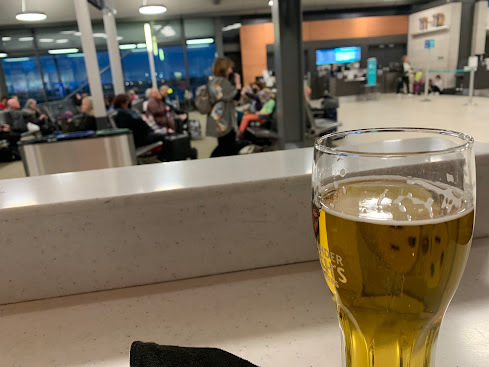 Thursday,November 2, 2023: We flew, late. And our 4:55pm direct flight to Orlando was delayed by nearly four hours, due to something discovered on the flight that landed, earlier that day. Why did it take so long to discover, and then search? Because we weren't told anything at all, I simply presumed it to be a loose monkey on the plane (I attempted to tell this to others around us, but I don't think anyone bought it). Apparently they even had to bring in a sniffer dog. We weren't even sure we'd make it out, honestly. But we did. Aoife knocked out cold on the plane.
Thursday,November 2, 2023: We flew, late. And our 4:55pm direct flight to Orlando was delayed by nearly four hours, due to something discovered on the flight that landed, earlier that day. Why did it take so long to discover, and then search? Because we weren't told anything at all, I simply presumed it to be a loose monkey on the plane (I attempted to tell this to others around us, but I don't think anyone bought it). Apparently they even had to bring in a sniffer dog. We weren't even sure we'd make it out, honestly. But we did. Aoife knocked out cold on the plane.  Friday,November 3, 2023: We woke slow, set in what was most likely a former condo. Oh, how late we got in. Once up, we headed for a full day of Universal, Orlando. Is Orlando a real place, or is it imaginary? A city of highways, condos, resorts and warehouses, it would seem. A city of palm trees and ridiculous adventure-lands. This city might just be imaginary.
Friday,November 3, 2023: We woke slow, set in what was most likely a former condo. Oh, how late we got in. Once up, we headed for a full day of Universal, Orlando. Is Orlando a real place, or is it imaginary? A city of highways, condos, resorts and warehouses, it would seem. A city of palm trees and ridiculous adventure-lands. This city might just be imaginary. Admittedly, the high point was the Harry Potter world stuff (Rose and Aoife had been years collecting change in a jar, all of which was for us to come to this specific place), both Diagon Alley in one corner, and Hogsmeade in another. The children hated the butterbeer (butterscotch foamy drink). I enjoyed a real beer. A dragon breathed fire. There were so many shops! They just wanted our money, methinks. We rode the Hogwarts train. The children collected wands. We went on a Minions ride that was amusing to all. Aoife met characters from the movie Sing. We saw Krazy Kat, and various Marvel things. I purchased a t-shirt.
Admittedly, the high point was the Harry Potter world stuff (Rose and Aoife had been years collecting change in a jar, all of which was for us to come to this specific place), both Diagon Alley in one corner, and Hogsmeade in another. The children hated the butterbeer (butterscotch foamy drink). I enjoyed a real beer. A dragon breathed fire. There were so many shops! They just wanted our money, methinks. We rode the Hogwarts train. The children collected wands. We went on a Minions ride that was amusing to all. Aoife met characters from the movie Sing. We saw Krazy Kat, and various Marvel things. I purchased a t-shirt.
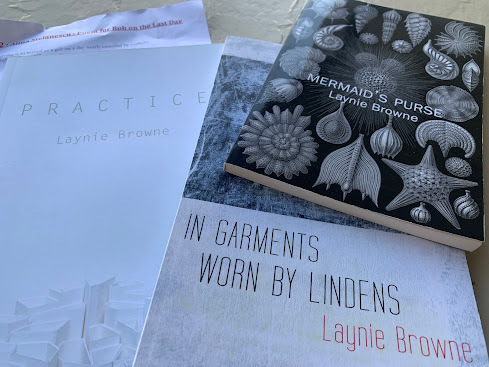 Saturday,November 4, 2023: We had a quiet day, mostly at the condo space. I spent some time with notebook, and books by Laynie Browne, as well as my copy of Barry McKinnon's i wanted to say something, which I'd brought to poke through. I made various notes, some of which I'm still processing, adding to. I am still thinking upon. Christine and her mother made plans.
Saturday,November 4, 2023: We had a quiet day, mostly at the condo space. I spent some time with notebook, and books by Laynie Browne, as well as my copy of Barry McKinnon's i wanted to say something, which I'd brought to poke through. I made various notes, some of which I'm still processing, adding to. I am still thinking upon. Christine and her mother made plans.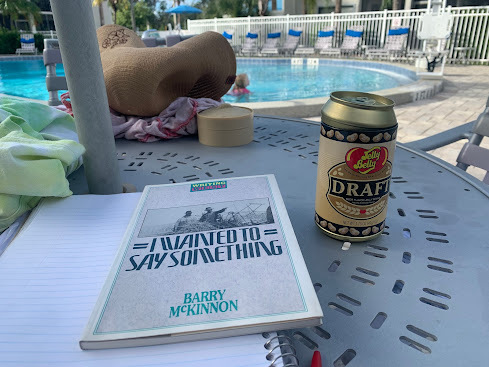 The tennis court across from our window also included a pickleball option, and large-scale chess and checkers, which occasionally folk would wander by and attempt. The children, at one point, made for the pool, so naturally I brought my books and my notebook, sketching out an hour's worth of notes. We wandered stores (I bought new shoes), found a dollar store and Christine and I picked up armloads of candy we can't get up here. Baby Ruth! Beer-flavoured jellybeans! What! Dinner at Red Lobster, a restaurant I don't think I've been to in years. My mother used to enjoy going regularly to one near home with my sister. I always think of them when I think of Red Lobster. The corn bread was excellent.
The tennis court across from our window also included a pickleball option, and large-scale chess and checkers, which occasionally folk would wander by and attempt. The children, at one point, made for the pool, so naturally I brought my books and my notebook, sketching out an hour's worth of notes. We wandered stores (I bought new shoes), found a dollar store and Christine and I picked up armloads of candy we can't get up here. Baby Ruth! Beer-flavoured jellybeans! What! Dinner at Red Lobster, a restaurant I don't think I've been to in years. My mother used to enjoy going regularly to one near home with my sister. I always think of them when I think of Red Lobster. The corn bread was excellent.
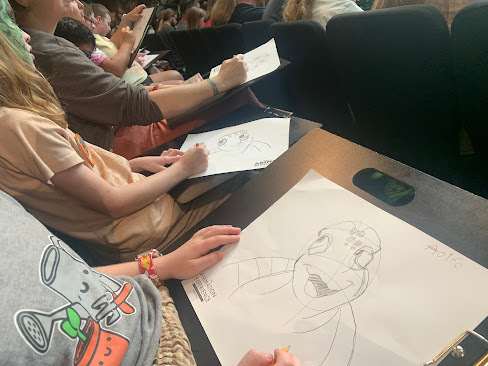 Sunday,November 5, 2023: Disneything, Animal Kingdom. Why are there Christmas trees and decorations everywhere? I don't want to think about that yet. We left our morning condo for our Disney-specific resort, meaning we became folded into the Disney space for five full days. We were beyond the scope of the real world, caught up in what only existed within. Aren't there science fiction films that begin this way? We saw wild animals in wide open spaces and attended an animation session, learning how to draw the sea turtle from Finding Nemo.
Sunday,November 5, 2023: Disneything, Animal Kingdom. Why are there Christmas trees and decorations everywhere? I don't want to think about that yet. We left our morning condo for our Disney-specific resort, meaning we became folded into the Disney space for five full days. We were beyond the scope of the real world, caught up in what only existed within. Aren't there science fiction films that begin this way? We saw wild animals in wide open spaces and attended an animation session, learning how to draw the sea turtle from Finding Nemo. 
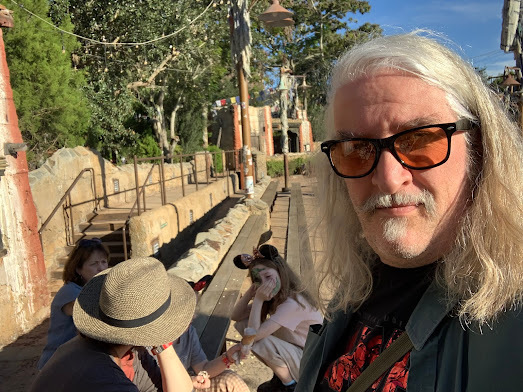 We saw a giraffe, some lions, some hippo. We saw artificial mountains. The scale of this place I find quite overwhelming, quite terrifying. Why is everything so enormously big?
We saw a giraffe, some lions, some hippo. We saw artificial mountains. The scale of this place I find quite overwhelming, quite terrifying. Why is everything so enormously big?
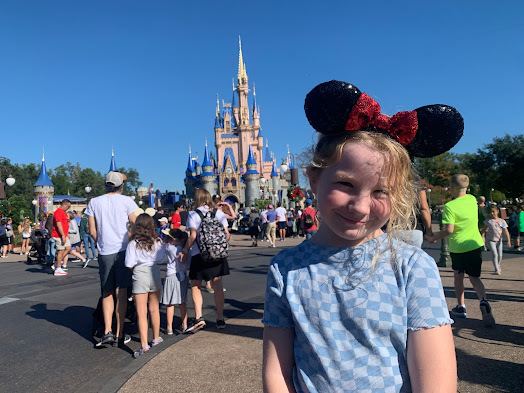 Monday,November 6, 2023: Magic Kingdom, day one. Did I ever imagine myself here, let alone three times, including twice in one week? It is all madness, really. The real chaos is knowing that, no matter how busy this seems, we're here in the off-season. We wandered spaces and rides, and the young ladies caught photos with Winnie-the-Pooh and Tigger (I kept calling them "Winston the Poop" and "Tiggles," which my entire menagerie found rather irritating). I was surprised how much Rose was enamoured with all of this, less than three weeks away from ten (when she would be priced as an adult, which was a big factor in the timing of this trip). Apparently Winnie-the-Pooh is her favourite, which I had no idea. I should tell her about the Winnie-the-Pooh and the Blustery Day VHS that we'd put in regularly when her big sister Kate was a toddler, when we needed just twenty minutes or so to be able to breathe on our own (we played that thing hundreds of times, I think). Aoife even insisted on writing Winnie-the-Pooh a note of thanks, while I think Rose caught an autograph.
Monday,November 6, 2023: Magic Kingdom, day one. Did I ever imagine myself here, let alone three times, including twice in one week? It is all madness, really. The real chaos is knowing that, no matter how busy this seems, we're here in the off-season. We wandered spaces and rides, and the young ladies caught photos with Winnie-the-Pooh and Tigger (I kept calling them "Winston the Poop" and "Tiggles," which my entire menagerie found rather irritating). I was surprised how much Rose was enamoured with all of this, less than three weeks away from ten (when she would be priced as an adult, which was a big factor in the timing of this trip). Apparently Winnie-the-Pooh is her favourite, which I had no idea. I should tell her about the Winnie-the-Pooh and the Blustery Day VHS that we'd put in regularly when her big sister Kate was a toddler, when we needed just twenty minutes or so to be able to breathe on our own (we played that thing hundreds of times, I think). Aoife even insisted on writing Winnie-the-Pooh a note of thanks, while I think Rose caught an autograph.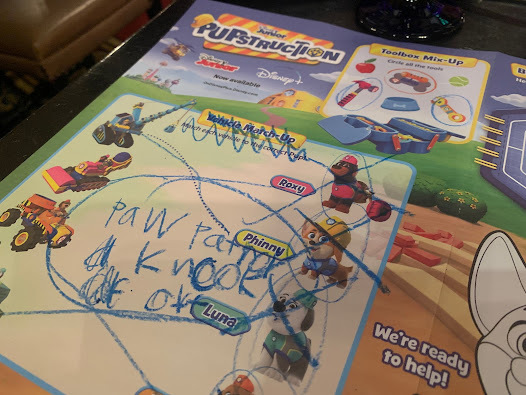 The young ladies later had the (mostly) full princess treatment, and even dinnered at the castle, with five different Disney princesses wandering through. Rose and Aoife complained heavily on their paper placemats of the obvious Disney-specific Paw Patrol knock-offs, "pupstruction," and I admired their venom, but not sure which side to be on, in this one. Both sides have their problems, but one would think that Disney would have been able to find their own characters to display instead of skewering another, right? It was ridiculous, with wait staff dressed in castle finery, and various princesses wandering through for photographs and autographs (all of which our young ladies garnered), and they were both given plastic swords at the end (apparently boys got swords and shields, and girls were supposed to get something else, but they were out of those). So many small girls in that space dressed as princesses, swinging plastic swords around. More princesses need their own swords, I say.
The young ladies later had the (mostly) full princess treatment, and even dinnered at the castle, with five different Disney princesses wandering through. Rose and Aoife complained heavily on their paper placemats of the obvious Disney-specific Paw Patrol knock-offs, "pupstruction," and I admired their venom, but not sure which side to be on, in this one. Both sides have their problems, but one would think that Disney would have been able to find their own characters to display instead of skewering another, right? It was ridiculous, with wait staff dressed in castle finery, and various princesses wandering through for photographs and autographs (all of which our young ladies garnered), and they were both given plastic swords at the end (apparently boys got swords and shields, and girls were supposed to get something else, but they were out of those). So many small girls in that space dressed as princesses, swinging plastic swords around. More princesses need their own swords, I say. 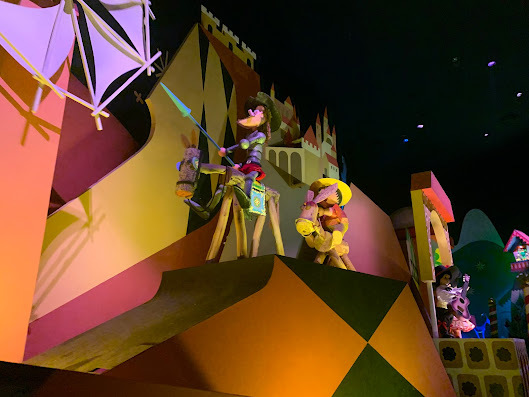 Oh yes, and the "it's a small world" ride, once more. We did same with toddler Rose, but she remembers none of it. Both ladies were quite taken with it. I mean, the old standards are important. And Don Quixote!
Oh yes, and the "it's a small world" ride, once more. We did same with toddler Rose, but she remembers none of it. Both ladies were quite taken with it. I mean, the old standards are important. And Don Quixote!
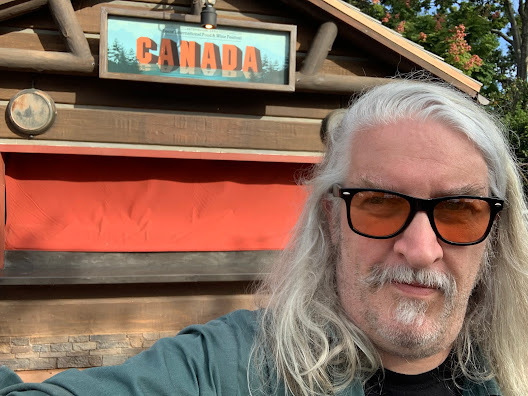 Tuesday,November 7, 2023: Epcot, wandering. We went through Canada, of course, as I sang songs by The Tragically Hip under my breath. We caught the Day of the Dead festival display in Mexico, and mother in law purchased a cuckoo clock in the German Pavillion, to replace one she once had, long gone. I considered a stein, but the price, weight, travel considerations and the fact that I don't even use the ones I have at home prompted me to rethink (they were pretty cool, though). Did you know that "stein" translates to "stone"? There was a grand arch in the Chinese Pavillion (ours in Ottawa is better). We had lunch in the same German buffet we did from that prior visit, but mis-timed from the show. I kept telling Aoife that we were depending upon her German language classes for the sake of ordering, which terrified her (no! I can't do that!). The food was grand (traditional!) but uber-expensive. Mein Gott!
Tuesday,November 7, 2023: Epcot, wandering. We went through Canada, of course, as I sang songs by The Tragically Hip under my breath. We caught the Day of the Dead festival display in Mexico, and mother in law purchased a cuckoo clock in the German Pavillion, to replace one she once had, long gone. I considered a stein, but the price, weight, travel considerations and the fact that I don't even use the ones I have at home prompted me to rethink (they were pretty cool, though). Did you know that "stein" translates to "stone"? There was a grand arch in the Chinese Pavillion (ours in Ottawa is better). We had lunch in the same German buffet we did from that prior visit, but mis-timed from the show. I kept telling Aoife that we were depending upon her German language classes for the sake of ordering, which terrified her (no! I can't do that!). The food was grand (traditional!) but uber-expensive. Mein Gott! 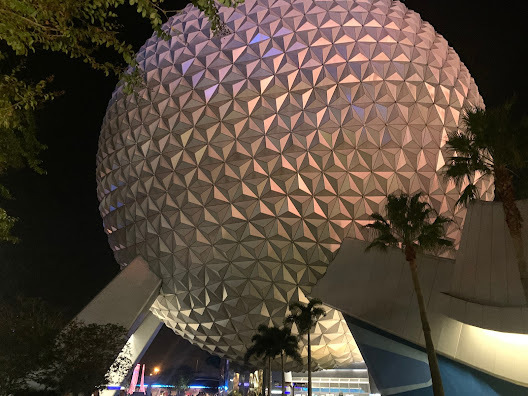 We caught a ride with Olaf and Elsa and Anna. We wandered the whole history of human civilization through Epcot, and dinnered with an aquarium of fish (where Rose, again, complained of the placemats and character knock-offs). We rode through Imagination Land. A sequence of days where there was barely enough time to wake, check email, and leave. Once back to the resort at the end of the day, we all crashed.
We caught a ride with Olaf and Elsa and Anna. We wandered the whole history of human civilization through Epcot, and dinnered with an aquarium of fish (where Rose, again, complained of the placemats and character knock-offs). We rode through Imagination Land. A sequence of days where there was barely enough time to wake, check email, and leave. Once back to the resort at the end of the day, we all crashed.
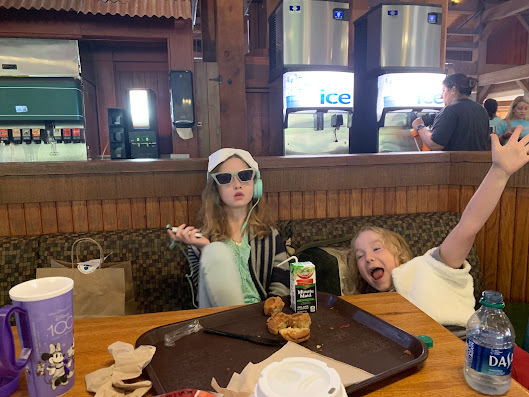 Wednesday,November 8, 2023: Cafeteria breakfast, at the resort. As this snapshot suggests, Rose is leaning pretty hard into pre-teen stuff, I would say. I ask you: what is morning? What is coffee? A needlessly-expensive bottle of (what I would discover to be) terrible wine collected for evenings.
Wednesday,November 8, 2023: Cafeteria breakfast, at the resort. As this snapshot suggests, Rose is leaning pretty hard into pre-teen stuff, I would say. I ask you: what is morning? What is coffee? A needlessly-expensive bottle of (what I would discover to be) terrible wine collected for evenings.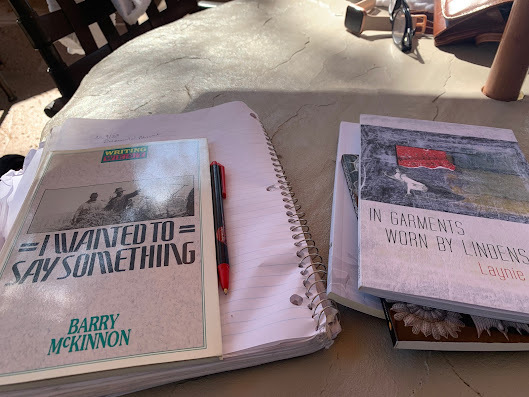 There is an island by our resort with a pool, so I sat with Barry McKinnon again, as mother in law and the children splashed about. I made further notes, and thought about whether I should garner a beer, for Barry's sake (it was barely 11am, so decided it was a bit early).
There is an island by our resort with a pool, so I sat with Barry McKinnon again, as mother in law and the children splashed about. I made further notes, and thought about whether I should garner a beer, for Barry's sake (it was barely 11am, so decided it was a bit early).





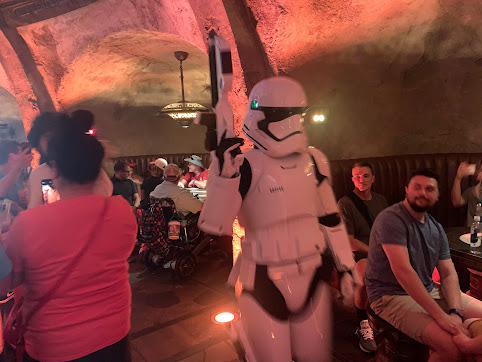 Today was Hollywood Studios, so I was pretty excited for the sake of the Star Wars stuff. I took Barry to see the Millennium Falcon, naturally. I took Barry McKinnon into the Cantina. Not even the Storm Troopers who came through could wrest that away from me. And we realized that Christine, in her own way, was inadvertently dressed entirely appropriate for Tattoine.
Today was Hollywood Studios, so I was pretty excited for the sake of the Star Wars stuff. I took Barry to see the Millennium Falcon, naturally. I took Barry McKinnon into the Cantina. Not even the Storm Troopers who came through could wrest that away from me. And we realized that Christine, in her own way, was inadvertently dressed entirely appropriate for Tattoine.
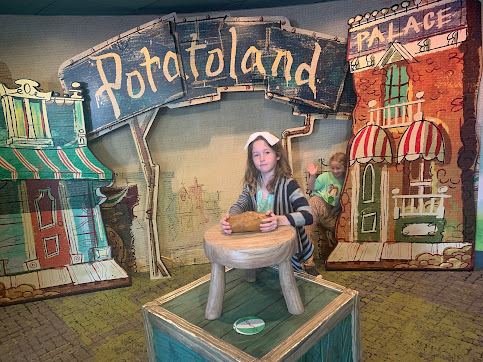 We went to a Mickey Mouse animated short in one theatre, and had a 3-D Muppet Show experience in The Muppet Theatre. We went to Potatoland. We had buckets upon buckets of popcorn. We had dinner in a drive-in theatre that showed theatrical trailers from classic horror flicks! After the past couple of days, Christine appreciated how quiet this particular dinner was, volume-wise. All eyes caught up on the big screen. Plan 9 from Outer Space!
We went to a Mickey Mouse animated short in one theatre, and had a 3-D Muppet Show experience in The Muppet Theatre. We went to Potatoland. We had buckets upon buckets of popcorn. We had dinner in a drive-in theatre that showed theatrical trailers from classic horror flicks! After the past couple of days, Christine appreciated how quiet this particular dinner was, volume-wise. All eyes caught up on the big screen. Plan 9 from Outer Space!
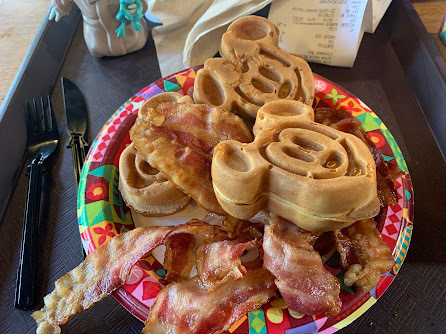 Thursday,November 9, 2023: Not enough food here is shaped like Mickey Mouse. Is this a real complaint I have? Hard to tell, isn't it. We took a riverboat after breakfast to one of the other resorts nearby, mainly so we could catch a riverboat, but also, so we could make the French Quarter resort and have those sugar-donut things. What are those called? I know Christine and I had some back in New Orleans in 2012 [remember when we were down there?]. Naturally, Rose managed to get white sugar everywhere (and yes, they were shaped like Mickey Mouse, as they should be).
Thursday,November 9, 2023: Not enough food here is shaped like Mickey Mouse. Is this a real complaint I have? Hard to tell, isn't it. We took a riverboat after breakfast to one of the other resorts nearby, mainly so we could catch a riverboat, but also, so we could make the French Quarter resort and have those sugar-donut things. What are those called? I know Christine and I had some back in New Orleans in 2012 [remember when we were down there?]. Naturally, Rose managed to get white sugar everywhere (and yes, they were shaped like Mickey Mouse, as they should be). After that, we made for our second Magic Kingdom day before heading out. We saw the noon parade, which we caught the tail end of again, repeated, later on. How many times does one see two parades in a single day? Hard to imagine the staff not sick of such things, after a time. The sky was perfect blue.
After that, we made for our second Magic Kingdom day before heading out. We saw the noon parade, which we caught the tail end of again, repeated, later on. How many times does one see two parades in a single day? Hard to imagine the staff not sick of such things, after a time. The sky was perfect blue.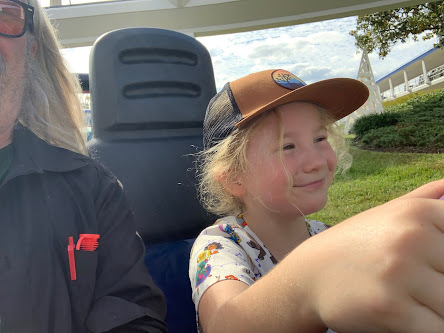 We caught an enormity of rides, again. They caught Aladdin's carpet ride at one point, the spinning aliens from Toy Story, and the Dumbo rides (classic), of course. Which day did I regrettably catch The Guardians of the Galaxy ride that nearly killed me? I can't even remember now. I regret it, terribly. It nearly did me in. And there was a follow-up, a day or two later, via Star Wars that nearly did the same. And yet, the children were fine. Let us speak no more of this.
We caught an enormity of rides, again. They caught Aladdin's carpet ride at one point, the spinning aliens from Toy Story, and the Dumbo rides (classic), of course. Which day did I regrettably catch The Guardians of the Galaxy ride that nearly killed me? I can't even remember now. I regret it, terribly. It nearly did me in. And there was a follow-up, a day or two later, via Star Wars that nearly did the same. And yet, the children were fine. Let us speak no more of this. Honestly, the craziest part of Disney is that we kept seeing these things. The future, indeed!
Honestly, the craziest part of Disney is that we kept seeing these things. The future, indeed! And Aoife wanted a picture of this guy, who I recognized but she didn't. Quite terrifying, really. At least he's the mandolin player (as we all know: bass players can't be trusted).
And Aoife wanted a picture of this guy, who I recognized but she didn't. Quite terrifying, really. At least he's the mandolin player (as we all know: bass players can't be trusted).I insisted on catching the Hall of Presidents, also, before we left the park. There was considerable resistance by the adults in our group, but it was better than we might have thought. Odd, the whole thing of it. What are the stories we tell ourselves of ourselves?
And then leaving the park at 5pm to get back to the resort to pick up the car and our stuff to drop the car off at the airport and catch our 9pm flight home. A bit of chaos, that. And the smallest one barfed a couple of times right at the moment we were entering security (she was fine in the end, but it made the whole experience askew). Both kids slept on the plane. I did, also.
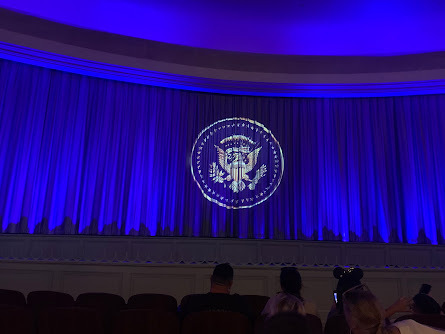 Friday,November 10, 2023: We are home, exhausted. Exhausted. Landed well after midnight. In our beds after 1am. Wemove very little once we are up in the morning. If at all. Did we move at all?
Friday,November 10, 2023: We are home, exhausted. Exhausted. Landed well after midnight. In our beds after 1am. Wemove very little once we are up in the morning. If at all. Did we move at all?
November 14, 2023
new from above/ground press: Collis, Armantrout, Christie, Reimer, Berlatsky, Mellis, Chernoff, Dachsel + Report from the fitzpatrick Society,
 ; Gardens in Motion, by Stephen Collis $5 ; STORY LINE, by Rae Armantrout $5 ; glass / language / untitled / exaltation (second printing, by Jason Christie $5 ; Dinosaurs of Glory, by Nikki Reimer $5 ; Send $19.99 for Supplements and Freedom, Collages and Uncreative Writing, by Noah Berlatsky $5 ; Unconsciousness Raising, by Miranda Mellis $6 ; ESTRO FLUNKY: FIELD NOTES, by MLA Chernoff $5 ; ashes, by Marita Dachsel $5 ; Report from the [ryan] fitzpatrick Society, Vol 1. No. 1, edited by rob mclennan $7 ;
; Gardens in Motion, by Stephen Collis $5 ; STORY LINE, by Rae Armantrout $5 ; glass / language / untitled / exaltation (second printing, by Jason Christie $5 ; Dinosaurs of Glory, by Nikki Reimer $5 ; Send $19.99 for Supplements and Freedom, Collages and Uncreative Writing, by Noah Berlatsky $5 ; Unconsciousness Raising, by Miranda Mellis $6 ; ESTRO FLUNKY: FIELD NOTES, by MLA Chernoff $5 ; ashes, by Marita Dachsel $5 ; Report from the [ryan] fitzpatrick Society, Vol 1. No. 1, edited by rob mclennan $7 ; AND DID YOU SEE THAT JASON CHRISTIE WON THE 2023 bpNICHOL CHAPBOOK AWARD LAST WEEK FOR HIS 2022 ABOVE/GROUND PRESS TITLE? (second printing now available, as well as a Jason Christie bundle,
keep an eye on the above/ground press blog for author interviews, new writing, reviews, upcoming readings and tons of other material; see the previous batch of backlist here,
published in Ottawa by above/ground press
October-November 2023
as part of the above/ground press 30th anniversary
a/g subscribers receive a complimentary copy of each
To order, send cheques (add $1 for postage; in US, add $2; outside North America, add $5) to: rob mclennan, 2423 Alta Vista Drive, Ottawa ON K1H 7M9. E-transfer or PayPal at at rob_mclennan (at) hotmail.com or the PayPal button (above). Scroll down here to see various backlist titles, or click on any of the extensive list of names on the sidebar (many, many things are still in print).
Review copies of any title (while supplies last) also available, upon request.
Forthcoming chapbooks by Sacha Archer, Dale Tracy, Melissa Eleftherion, Kyle Flemmer, Saba Pakdel, Lydia Unsworth, Katie Ebbitt, Colin Dardis, Russell Carisse, Micah Ballard, Cary Fagan, Amanda Deutch, Kyla Houbolt, Gary Barwin, Adriana Oniță, Blunt Research Group, Phil Hall + Steven Ross Smith, Zane Koss, Peter Myers, Ben Robinson, Terri Witek, Pete Smith, Angela Caporaso and a collaborative/call-and-response between Julie Carr and rob mclennan (among others, most likely). And 2024 subscriptions are now available!
November 13, 2023
12 or 20 (second series) questions with David Martin
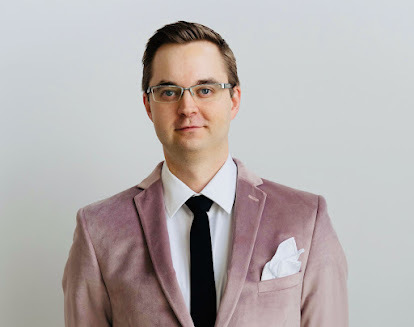 David Martin
worksas a literacy instructor in Calgary and as an organizer for the Single OnionPoetry Series. His first collection,
Tar Swan
(NeWest Press, 2018), wasa finalist for the Raymond Souster Award and the City of Calgary W. O. MitchellBook Prize. David’s work has been awarded the CBC PoetryPrize, and has been shortlisted for prizes from FreeFall, Vallum, PRISMinternational,and the Alberta Magazine Awards. As well, he was named a “Writerto Watch” in 2023 by CBC Books. His latest collection, Kink Bands, waspublished by NeWest Press in September of 2023.
David Martin
worksas a literacy instructor in Calgary and as an organizer for the Single OnionPoetry Series. His first collection,
Tar Swan
(NeWest Press, 2018), wasa finalist for the Raymond Souster Award and the City of Calgary W. O. MitchellBook Prize. David’s work has been awarded the CBC PoetryPrize, and has been shortlisted for prizes from FreeFall, Vallum, PRISMinternational,and the Alberta Magazine Awards. As well, he was named a “Writerto Watch” in 2023 by CBC Books. His latest collection, Kink Bands, waspublished by NeWest Press in September of 2023. 1- How did your first book change your life? How does your most recent workcompare to your previous? How does it feel different?
Idon’t think my first book, Tar Swan, changed my life drastically, but itwas rewarding to see in print a project that had taken about ten years tocomplete. It was also very gratifying when readers and reviewers would engagewith what I had written and spent so much time working on.
Inmy most recent work, Kink Bands, I moved away from the book-lengthnarrative style of my first collection, but I still kept things feeling unifiedwith the general theme of geology coursing through the poems. I believe that Iwas able to explore more experimental aspects of my poetry, while also movingtowards a personal, lyrical approach in some of the pieces.
2- How did you come to poetry first, as opposed to, say, fiction or non-fiction?
Iwas taking an undergraduate survey course in poetry, and was immersed instudying the famous names of the art, when I happened to meet with a group thatcalled themselves the Drunken Poets Society. They would get together everyMonday at the Ship & Anchor Pub and discuss poetry, as well as share theirown work. This was quite a revelation for me, to find writers for whom poetrywas a living art, and the combination of studying poetry at the university andrevelling in the new poetry that I was hearing really got me hooked on theform.
3- How long does it take to start any particular writing project? Does yourwriting initially come quickly, or is it a slow process? Do first drafts appearlooking close to their final shape, or does your work come out of copiousnotes?
Theprojects usually develop slowly, with a general sense of what I’m seeking, butthis can shift and be refined as I continue to work on them. Often my firstdrafts, of both individual poems and manuscripts, look very different than thefinal versions. I’m always aiming to fine tune a piece and see how it can beimproved or taken in a new direction.
Forsome projects, like Tar Swan, I will do a lot of research, bothtechnical and archival, while others have a more direct link to my personalexperiences.
4- Where does a poem usually begin for you? Are you an author of short piecesthat end up combining into a larger project, or are you working on a"book" from the very beginning?
Forsome manuscripts, I have a guiding theme from the outset, and for others it’smore a process of writing to find out what I’m really writing about. In a fewcases, an editor who is helping me with my work will discern a theme ornarrative that I was not aware of, and then this can be something I uncover andexplore more deliberately. It’s interesting to me when an outside perspectivecan recognize patterns and ideas in the work that I’m not noticing.
5- Are public readings part of or counter to your creative process? Are you thesort of writer who enjoys doing readings?
Ienjoy sharing my work at readings, but it’s usually when pieces are quite faralong in their development.
6- Do you have any theoretical concerns behind your writing? What kinds ofquestions are you trying to answer with your work? What do you even think thecurrent questions are?
Ioften have a general question or general theme that I’m chasing in my work. Forinstance, with my first book I was interested in creating an understanding ofthe history and mythology of the Alberta oil sands that one wouldn’t find inother books about the subject. With the most recent collection, Kink Bands,I was wondering about how to use geology as a means of looking at the world,how to experiment with the theme in ways that perhaps other poets haven’texplored, and how to enact geological processes within the space of a poem.
7 –What do you see the current role of the writer being in larger culture? Do theyeven have one? What do you think the role of the writer should be?
Ithink each writer makes their own decision about where their interests lie andwhere they will focus their attention. Often there is a binary between personaland public-facing poetry, but there are many examples of introspective workthat resonates with a group of readers and thus takes on a public aspect. Iwouldn’t want to prescribe a strict role for the poet in society (as witness,philosopher, avant-garde experimenter, etc), but instead think that each poetis pulled to the themes that move them the most.
8- Do you find the process of working with an outside editor difficult oressential (or both)?
Ifind it incredibly helpful to work with an editor, as long as it is someone whois engaged with the poems and whose advice I trust. Often I get caught up in myown ideas, and it’s necessary for me to find out what someone else will make ofwhat I’ve written. Are they able to come along with me on the poetic journey I’velaid out (no matter how strange it may be), or have I lost them somewhere alongthe way? I’ve had positive experiences with editors who are able to discern acohesive theme from a set of what I felt were miscellaneous poems, and I’ve hadgreat experiences with an editor finding the one word or line that needs to bechanged to make everything click into place.
9- What is the best piece of advice you've heard (not necessarily given to youdirectly)?
Thebest piece of advice was given to me by a co-worker, almost in passing, and itpertains to raising kids. She told me that when your kids are young they willneed help with almost everything, but you, as the parent, will be able to solvepretty much all of their problems. As your children grow up, however, they willneed less and less help, but the situations that they do require assistancefrom you will be harder for you to solve (social interactions, friendships,etc). I always liked that advice, and especially as it was delivered offhandwhile at work.
10- What kind of writing routine do you tend to keep, or do you even haveone? How does a typical day (for you) begin?
Idon’t have a strict writing routine, but I do try to carve out a few dedicatedslots of time during the week when I can focus on writing.
11- When your writing gets stalled, where do you turn or return for (for lack ofa better word) inspiration?
UsuallyI find reading poetry will get me out of a rut of some kind. I try to readquite widely, in general, and I find that ideas can pop up from readingscientific articles, poems, essays, news articles, pretty much anything.
12- What fragrance reminds you of home?
Thescent of baking coming from the my mother’s kitchen is a strong reminder ofhome for me.
13- David W. McFadden once said that books come from books, but are there anyother forms that influence your work, whether nature, music, science or visualart?
Mywork can be influenced by historical events, environmental phenomena,scientific research, listening to music, and many other things.
14- What other writers or writings are important for your work, or simply yourlife outside of your work?
I’ma big fan of the poet Michael Donaghy. He isn’t all that well known in NorthAmerica, as most of his publishing was done in the U.K., but when I came acrosshis work it was a revelation to me about what could be done in the small spaceof a single poem. He makes intricately designed works seem like the mostnatural thing that you happen to be overhearing.
15- What would you like to do that you haven't yet done?
I’mworking on a libretto for an opera, and during the pandemic I tried my hand atwriting a novel. So I’ve been trying to work outside of my normal comfort zone.Maybe one day I’ll try writing short fiction, something I’ve never really donebefore.
16- If you could pick any other occupation to attempt, what would it be? Or,alternately, what do you think you would have ended up doing had you not been awriter?
I’ma musician in several different bands, but a part of me wonders what it wouldhave been like to try to be a professional musician.
17- What made you write, as opposed to doing something else?
Ido other things, such as work as a literacy instructor, play music, andvolunteer for a poetry reading series, but I’m always drawn back to writingbecause I’m obsessed with the possibilities of language, and I’m constantlyseeking new avenues to explore in my poetry.
18- What was the last great book you read? What was the last great film?
Idon’t watch many movies, unless it’s something my kids want to see.
Thelast great book I read was The Liars of Nature and the Nature of Liarsby Lixing Sun. I’m starting a new project about cheats, thieves, andcon-artists, in both the human and non-human worlds, and this book was veryinteresting and relevant for me.
19- What are you currently working on?
Rightnow I’m working on the final edits for a collection coming out next spring. It’sa work of experimental translations, framed by a speculative fiction narrative,and I’m a little apprehensive about what people will think about it.
November 12, 2023
Dorothea Lasky, The Shining
BLUE CHRISTMAS
I am so excited
I am dancing with mysister
In the front of therestaurant
Two men look at us andsmile
We are wearing theclearest blue dresses
That look like the sky inthe middle of the spring
There is a pretend antagonismto our song
But we know that wereally love each other
Years later they willfilm us as children
Wearing matching dressesagain
But the blue will bemuted
Soon after they will showus chopped up
As always they will beobsessed
With the violence men cando to us
But I was only evertrying to do my job
I only ever wanted to bea movie star
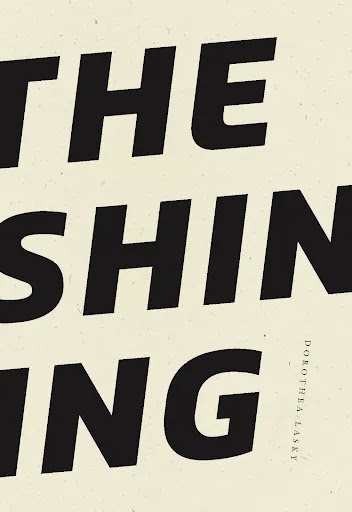 Thelatest from American poet Dorothea Lasky, following her essay-quartet,
Animal
(Seattle WA/New York NY: Wave Books, 2020) [see my review of such here] is thepoetry collection,
The Shining
(Wave Books, 2023). Riffing off itsnamesake film, as the press release offers, Lasky’s The Shining “is anekphrastic horror lyric that shapes an entirely unique feminist psychologicallandscape. Here, Lasky guides us through the familiar rooms of the OverlookHotel, both realized and imagined, inhabiting characters and spaces that havebeen somewhat flattened in Stephen King’s text or Stanley Kubrick’s film adaptations.” Lasky fleshes out the asides to the main action, almost as a darkturn (if one might say) akin to Tom Stoppard’s 1966 play Rosencrantz and GuildensternAre Dead, or even Steve Englehart’s run through West Coast Avengers#17-24 (1987) that ran alongside and through early Avengers and FantasticFour histories. Through her usual playful swagger of dark turns, Laskyutilizes the bones of the source material to carve out lyrics sharp enough to drawblood. “I was Dorothea Lasky,” she writes, to close the poem “TIME,” “Now myname is nothing / But I never forgot my name / Did you [.]” Lasky’s poems aredark and complex, writing of innocence revealed and lost, writing slant acrossa horror lyric. “The key to surviving in here,” she writes, to open the poem “STRANGEHUMOR,” “Is to pretend every room is haunted / Even when it isn’t [.]” Laskywrites from and within spaces King and Kubrick could never hope to fathom,offering a sequence of horrors that exist not purely in the extraordinary but acrossmore familiar spaces. Through Lasky, background characters move from meredecoration to flesh, and to acknowledgment and even, finally, agency. “What islanguage / Is the question I ask the large peacock,” she writes, as part of thepoem “MARRIAGE,” “Who sits at the end of the bed / Smiling the grin of demons /Bending its neck to get a good look at me [.]” It is through Lasky, finally,that these characters are allowed their own stories.
Thelatest from American poet Dorothea Lasky, following her essay-quartet,
Animal
(Seattle WA/New York NY: Wave Books, 2020) [see my review of such here] is thepoetry collection,
The Shining
(Wave Books, 2023). Riffing off itsnamesake film, as the press release offers, Lasky’s The Shining “is anekphrastic horror lyric that shapes an entirely unique feminist psychologicallandscape. Here, Lasky guides us through the familiar rooms of the OverlookHotel, both realized and imagined, inhabiting characters and spaces that havebeen somewhat flattened in Stephen King’s text or Stanley Kubrick’s film adaptations.” Lasky fleshes out the asides to the main action, almost as a darkturn (if one might say) akin to Tom Stoppard’s 1966 play Rosencrantz and GuildensternAre Dead, or even Steve Englehart’s run through West Coast Avengers#17-24 (1987) that ran alongside and through early Avengers and FantasticFour histories. Through her usual playful swagger of dark turns, Laskyutilizes the bones of the source material to carve out lyrics sharp enough to drawblood. “I was Dorothea Lasky,” she writes, to close the poem “TIME,” “Now myname is nothing / But I never forgot my name / Did you [.]” Lasky’s poems aredark and complex, writing of innocence revealed and lost, writing slant acrossa horror lyric. “The key to surviving in here,” she writes, to open the poem “STRANGEHUMOR,” “Is to pretend every room is haunted / Even when it isn’t [.]” Laskywrites from and within spaces King and Kubrick could never hope to fathom,offering a sequence of horrors that exist not purely in the extraordinary but acrossmore familiar spaces. Through Lasky, background characters move from meredecoration to flesh, and to acknowledgment and even, finally, agency. “What islanguage / Is the question I ask the large peacock,” she writes, as part of thepoem “MARRIAGE,” “Who sits at the end of the bed / Smiling the grin of demons /Bending its neck to get a good look at me [.]” It is through Lasky, finally,that these characters are allowed their own stories.
November 11, 2023
12 or 20 (second series) questions with Ruth DyckFehderau
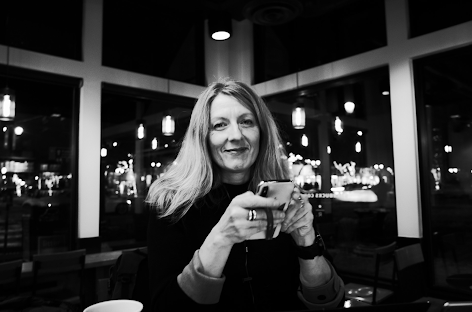 RuthDyckFehderau [photo credit: Manikarnika Kanjilal] has written two nonfictionbooks with James Bay Cree storytellers: The Sweet Bloods of Eeyou Istchee:Stories of Diabetes and the James Bay Cree (2017, 2nd Ed 2020)and E Nâtamukh Miyeyimuwin: Residential School Recovery Stories of theJames Bay Cree, Vol. 1 (2023).Her work has been translated into five languages and she has won manyliterary awards. She sometimes teaches Creative Writing and English Lit at theUniversity of Alberta. These days, she lives in Edmonton with her partner. Sheis hearing-impaired.
I (Athena)
isher first novel.
RuthDyckFehderau [photo credit: Manikarnika Kanjilal] has written two nonfictionbooks with James Bay Cree storytellers: The Sweet Bloods of Eeyou Istchee:Stories of Diabetes and the James Bay Cree (2017, 2nd Ed 2020)and E Nâtamukh Miyeyimuwin: Residential School Recovery Stories of theJames Bay Cree, Vol. 1 (2023).Her work has been translated into five languages and she has won manyliterary awards. She sometimes teaches Creative Writing and English Lit at theUniversity of Alberta. These days, she lives in Edmonton with her partner. Sheis hearing-impaired.
I (Athena)
isher first novel. More here: ruthdyckfehderau.com
First, rob, let me just say thank you! I appreciatethis opportunity!
1 - How didyour first book change your life? How does your most recent work compare toyour previous? How does it feel different?
My first and second books were written along withJames Bay Cree storytellers: The Sweet Bloods of Eeyou Istchee: Stories ofDiabetes and the James Bay Cree (2017) and E nâtamukw miyeyimuwin: Residential SchoolRecovery Stories of the James Bay Cree, Vol. 1 (2023). It’san incredible honour to hear and then write their stories, to work closely withElders, and to have my writing published under their imprint. So this novel, mythird book (though I started it first), is a very different experience and hasa different function. Even though it’s fiction, it’s more personal to me insome ways because I have chosen all the material. And in other ways it’s lesspersonal. (Writing the stories of others teaches me about myself.) Both thenovel and the Cree books require all my craft; in that way, they are similar.
2 - How didyou come to fiction first, as opposed to, say, poetry or non-fiction?
I have always considered myself a fiction writer.That I have two non-fiction books out now, with another couple commissioned, isas much a surprise to me as to anyone.
3 - How longdoes it take to start any particular writing project? Does your writinginitially come quickly, or is it a slow process? Do first drafts appear lookingclose to their final shape, or does your work come out of copious notes?
I prefer to write slowly. I love writing and try tosavour the process. And no, first drafts tend to look nothing like finaldrafts. I try things out, examine them from many angles, and delete whatdoesn’t work. Nothing is precious. For me, writing really is rewriting. Oftenmany times.
(That said, the books I write for the James BayCree come with a fierce sense of urgency. The remaining survivors of IndianResidential School are aging, and many of them want to participate in theproject, so I’m trying to gather as many stories as I possibly can, and I dowork at a slightly faster pace on that project.)
4 - Wheredoes a work of prose usually begin for you? Are you an author of short piecesthat end up combining into a larger project, or are you working on a"book" from the very beginning?
It depends on the material, I think. A storychooses its own genre and length and structure. Different every time.
5 - Arepublic readings part of or counter to your creative process? Are you the sortof writer who enjoys doing readings?
I love them! Reading stuff out loud to an emptyroom (or to my partner) is part of my process, part of how I know if mycharacters are authentic or contrived. Reading finished pieces isn’t part of mycreative process, really, since the stories are finished, but I do enjoyit.
6 - Do youhave any theoretical concerns behind your writing? What kinds of questions areyou trying to answer with your work? What do you even think the currentquestions are?
Questions change and shift with the politicalclimate, and that’s important. Those shifts often teach us to see those we’vemarginalized and help us to figure out how to be kind – and, for me, questions thataddress marginalization, kindness, and respect are the questions that matter. (Andthey’re timeless, really. Writers have been asking these questions forcenturies. I could go on…)
But I think a novel suffers if it’s about an idea(or a plot) rather than about a character.
7 – What doyou see the current role of the writer being in larger culture? Do they evenhave one? What do you think the role of the writer should be?
I think writers should write stories that compel them,stories driven by the characters themselves, because a character struggling tosee their way through the world around them is (I think) always revealing andalways relevant.
8 - Do youfind the process of working with an outside editor difficult or essential (orboth)?
The process of working with a good editor, turningover every word and phrase with another thinker, is a very great pleasure. Somepresses don’t use editors very much any more, and (I think) the writing suffersfor it.
9 - What isthe best piece of advice you've heard (not necessarily given to you directly)?
From a Cree Elder named Tommy Neeposh: “Listen. Ifyou don’t listen, you’re like a tied-up dog, walking in circles, always seeingthe same things, never knowing more than you know now.” (It’s the epigraph in E nâtamukw miyeyimuwin: Residential School Recovery Stories of the James Bay Cree.)
10 - Howeasy has it been for you to move between genres (non-fiction to fiction)? Whatdo you see as the appeal?
I don’t see them as very different, really. Thepoint is to use craft to tell a good story. The source of the material isdifferent but the skills are the same.
11 - Whatkind of writing routine do you tend to keep, or do you even have one? How doesa typical day (for you) begin?
I eat, I sleep, I write, I read,I exercise. I do some version of these in some order every day no matter whereI am in the world.
And it’s not always easy. Thelast time I lived in Nairobi, for instance, our neighbourhood had regularbrownouts, so I had to be sure to have a laptop battery that could hold 8hours’ charge, and to have it fully charged at the start of each day.
And exercise. In one place inthe North, for instance, some months were too cold for most outdoor exercise,the community gym hours conflicted with my schedule, and most buildings had lowceilings. I couldn’t even really do burpees or jumping jacks, let alone jumprope. So I figured out horizontal exercises. In Dhaka, I also couldn’t gooutside (security problems) so I ran stairs in our 6-storey building. But itwas so hot and I didn’t want to cover up in order to sweat and also didn’t wantto disrespect my Muslim neighbours by being in a shared space in workoutclothes. So I waited ‘til midnight when they (who woke early for morningprayers) were asleep and exercised then. Running in Johannesburg was its owntorment because the altitude is 1000+m higher than Edmonton. While living inPoland, way back in ’02, the guys at the gym kept trying to be chivalrous andlift the weights for me (eye roll). Etcetera. Eating and sleeping can alsorequire enomous creativity in some places, but you don’t want this to be anovel.
12 - Whenyour writing gets stalled, where do you turn or return for (for lack of abetter word) inspiration?
First, I usually work on two pieces simultaneously,and when I need a break from one, I go to the other. Second, I move. I usuallystand to write and do a good deal of pacing. If I’m stuck, I go for a run orlift some weights or do some yoga. The physical act of motion helps movethrough a writing or thinking clot as well.
13 - Whatfragrance reminds you of home?
Boreal forest after rain. Edmonton smells amazing.(Well, not so much these smoky days, but most of the time.)
14 - DavidW. McFadden once said that books come from books, but are there any other formsthat influence your work, whether nature, music, science or visual art?
All of the above. But also - people influence mywork. All the time. What they say, how they move, what they pay attention to.People are “forms,” right?
15 - Whatother writers or writings are important for your work, or simply your lifeoutside of your work?
Many of my closest friends are writers or artistsof some kind and they influence me a great deal. I also think it’s extremelyimportant to read stuff that’s very different from what I write. But here’s alist of writers whose work I regularly return to, specifically because theymake me think long after I have finished reading their books. So, here, in noparticular order:
Judith Herman, Elizabeth Strout, Tom Spanbauer,Tomson Highway, Octavia Butler, Stephanie Nolen, Barbara Gowdy, Pat Barker,Rebecca Makkai, Yevgeny Zamyatin, Gaetan Soucy, NK Jemisin, Philip Pullman,David Chariandy, Ursula K. LeGuin, Margaret Atwood, Margaret Laurence, AliceMunro, Mark Haddon, Lauren Berlant, Anthony Doerr, Judith Butler, ChandraMayor, Tola Rotimi Abraham, Emma Donaghue, Candas Jane Dorsey, Aritha Van Herk,Pauline Holdstock, Eden Robinson, Amia Srinivasan, Shyam Salvadurai, Anna MarieSewell, Fred Stenson, Lee Maracle, Jacqueline Rose, Ann-Marie Macdonald, EsiEdugyan, Virgina Woolf, Joseph Conrad, Shani Mootoo, Linda Alcoff, GloriaSawai, Hannah Arendt, John S. Milloy, Joanne Episkenew, Michael Ondaatje,Yasuko Thanh, JM Coetzee, Willa Cather, Timothy Findley, Jeanette Winterson, ToniMorrison, Elizabeth Knox, Michelle Good, Michel Foucault, Neil Gaiman, ShermanAlexie, Chinua Achebe, Astrid Blodgett, Richard Wagamese, Nalo Hopkinson,Jeffrey Eugenides, Olga Tokarczuk – yeah, I better stop. I’m not even half waythrough.
16 - Whatwould you like to do that you haven't yet done?
Grow really old. See some more places.
17 - If you couldpick any other occupation to attempt, what would it be? Or, alternately, whatdo you think you would have ended up doing had you not been a writer?
Oh wow. Any number of things. I like making things.I would have enjoyed being a filmmaker, though my hearing loss might havecaused problems. Before hearing loss, I was a part-time musician. I starteduniversity thinking I would go into medicine, and I still think I would’veenjoyed it. I appreciated working with folks living with brain injuries anddevelopmental disabilities (which figured prominently into I (Athena)) and could have made a career of that. Also enjoyedbeing a prof and could have done that full time. I love being outside, grew upon a farm, and don’t shy away from physical labour so that opens up otheropportunities. For this novel, I had to learn quite a bit about geology andtotally see the appeal. I could do almost anything if it paid my way to travelmore. Especially if I could write about them after.
18 - Whatmade you write, as opposed to doing something else?
I love stories. What a privilege to write them.
19 - Whatwas the last great book you read? What was the last great film?
I recently re-read a favourite: The Man Who Fell in Love with the Moonby Tom Spanbauer. Impresses me every time. And I recently re-watched one of myfavourite films: Antonia’s Line (Dir.Marleen Gorris)
20 - Whatare you currently working on?
Marketing the two books that I launched this year. Thinkingabout the next novel. Nearly half way through gathering and writing the storiesof Indian Residential School survivors for E nâtamukw miyeyimuwin Vol. 2.

